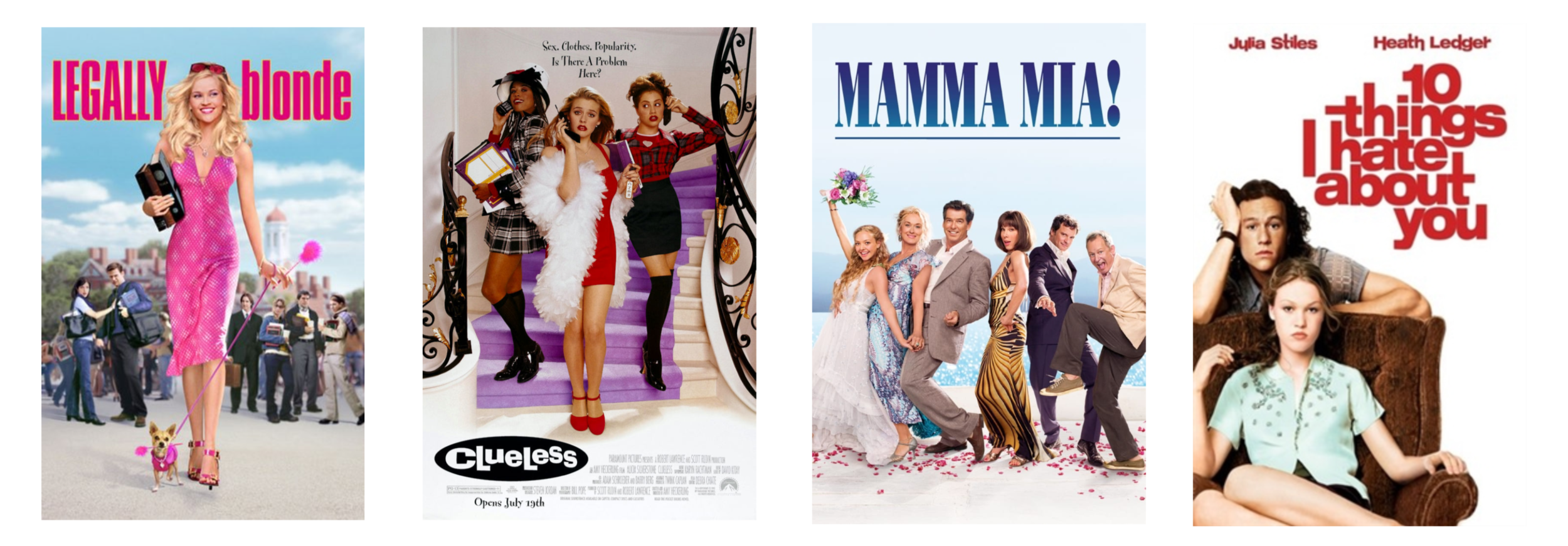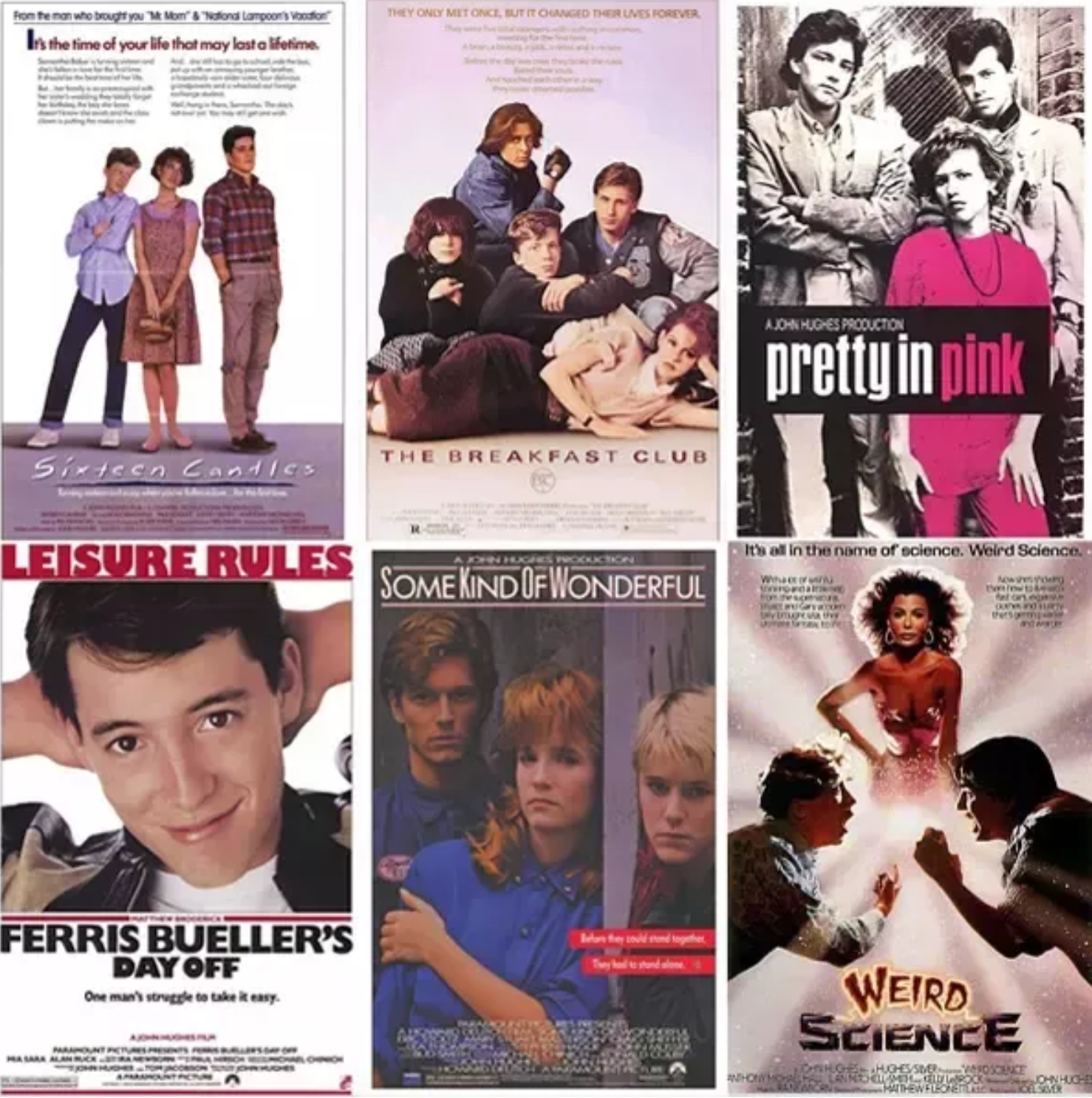Reclaiming the Rom-Com
Graphics by Agnes Lee.
I sit in bed on a Saturday night rewatching “27 Dresses” with my closest friends and wondering why I feel bashful about my weekend plans. My friend passes me the charcuterie board, and I take a bite of sharp cheddar cheese. We laugh at the funny parts and cry at the sad ones together. Once the movie ends, I reach for the remote to choose another rom-com.
Romantic comedies, or rom-coms, have been there for me my whole life. When I had a concussion, I watched “Legally Blonde.” Following my first break-up, I played “Mamma Mia” and belted out the lyrics to every ABBA song while trying not to cry. To combat seasonal depression, I chose “10 Things I Hate About You.” When I had a 103-degree fever because of the flu, I settled on “Clueless” to bring me comfort. I am not alone in fervently loving these movies – yet they still feel like a “guilty pleasure.”
Wendy Klunk, Medill ‘24, also loves rom-coms because they bring her joy. “It’s so fun to live vicariously through them,” Klunk says.
Romantic comedies make their respective audiences feel almost every emotion under the sun. They also bring people together.
Some of the iconic John Hughes rom-com movie posters.
Why do so many people feel ashamed of liking these movies? Romantic comedies have been awarded less respect than movies from other genres.
Rom-coms actually originate from Shakespeare. In the Elizabethan era, a comedy was defined as any play that ends in marriage, including “Much Ado About Nothing” (match-making schemes plus a doubtful proposal) and “Twelfth Night” (mistaken identities, practical jokes, and a double-marriage ending).
“She’s the Man” vs. “Twelfth Night” – same story in different fonts!
This definition created an association between romance and comedy. In fact, some beloved film rom-coms are retellings of Shakespeare plays. For example, “10 Things I Hate About You” is an adaptation of “Taming of the Shrew,” and “She’s the Man” is an adaptation of “Twelfth Night.”
400 years later, “screwball” comedies in the 1930s and 40s featured witty female protagonists finding their happily ever after. Later, the sexual liberation movement of the 60s and 70s (in tandem with the birth control pill’s increasing accessibility) encouraged sexuality to be viewed without guilt, shame or judgment. Romantic and sexual desires were thus explored more in media and pop culture, and romantic comedy became more of a solidified genre.
With the 80s and 90s came classic rom-coms like “Sixteen Candles” and “When Harry Met Sally.” Film studios realized that targeting these films to female audiences produced great success and assured profit. Many popular rom-coms of the time even used female writers and directors, the most famous of whom was Nora Ephron, who both wrote and directed “You’ve Got Mail” and “Sleepless in Seattle.”
A still from my personal favorite, “When Harry Met Sally.”
Though the genre has normally featured white and/or heteronormative couples, films like Crazy Rich Asians and Love, Simon are changing this narrative. Today, romantic comedies provide nostalgia, comfort, humor and romanticism in a world that can sometimes feel like the complete opposite of romantic and comedic.
Yet, why are rom-coms so much less respected than films of other genres, like dramas or action movies?
I propose that this lack of respect for the genre stems from rom-com bias: a watered-down form of misogyny. Either consciously or subconsciously, the genre is not taken as seriously because its lighthearted appeal targets women. Rom-com bias manifests itself with critics writing off the genre in a subconsciously sexist way.
Critics claim that rom-coms often follow a particular formula with common tropes like meet-cutes, enemies-to-lovers, montages, friends with benefits, forbidden love or make-out sessions in the pouring rain. It’s easy for critics to say that they all these rom-coms are same because they adhere to the same formula: but all movie genres follow a particular formula. Superhero movies, intense psychological thrillers, watered-down dramas — they all have a particular formula, too. A good movie does not have to be completely original (what movie is?); instead, a film should be judged on its ability to make the audience feel something.
Whether the intended goal is to make the audience laugh or make them cry, a good story is able to make its audience feel something. I consistently cry watching the end of “About Time.” No matter how many times I watch it, “Clueless” can still make me laugh. “Love Actually” reinvigorates my hope in humanity.
I would like to formally reclaim the rom-com, regardless of whatever rom-com bias society may have. I will be watching “When Harry Met Sally” this Valentine’s Day and baking a heart-shaped cake with my closest friends. And I am not ashamed of it.





